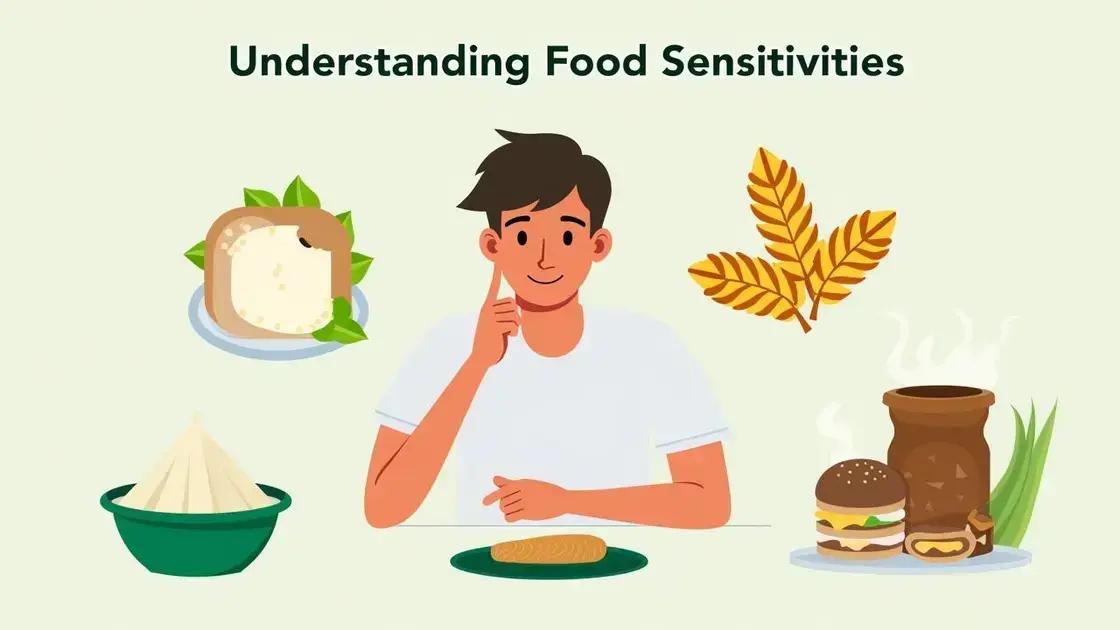To identify and manage food sensitivities, keep a food diary to track symptoms, try an elimination diet to discover triggers, and consult healthcare professionals when needed for tailored advice and support.
Are you feeling unwell after meals? How to identify and manage food sensitivities is crucial for your health and well-being. Food sensitivities can cause discomfort and a variety of symptoms that impact daily life. In this article, we will delve into what food sensitivities are, how to recognize them, and effective management strategies to help you feel your best. Stay tuned as we guide you through practical tips and insights for understanding and addressing this common issue.
Understanding Food Sensitivities

Understanding food sensitivities is essential for anyone who experiences discomfort after eating. Unlike food allergies, which can trigger severe reactions, food sensitivities generally lead to digestive issues and other symptoms that can disrupt daily life.
What Are Food Sensitivities?
Food sensitivities refer to the body’s negative reactions to certain foods, often linked to difficulty digesting or processing specific components. The most common substances associated with food sensitivities include gluten, dairy, nuts, and certain food additives.
How Do Food Sensitivities Differ from Allergies?
It is important to note the difference between food sensitivities and food allergies. Allergies involve the immune system and can cause anaphylactic reactions. In contrast, sensitivities tend to cause symptoms over time and may not be life-threatening. However, they can still significantly affect an individual’s quality of life.
Common Triggers for Food Sensitivities
Some typical foods that trigger sensitivities include:
- **Dairy products** – Lactose intolerance can lead to bloating and stomach cramps.
- **Gluten** – Individuals with gluten sensitivity may experience fatigue and gastrointestinal issues.
- **Certain fruits and vegetables** – Some may react poorly to high-salicylate foods, leading to headaches or skin reactions.
- **Processed foods** – Additives and preservatives often cause reactions in sensitive individuals.
Identifying Food Sensitivities
Understanding how to identify food sensitivities involves observing patterns in your body’s reactions after eating. Keeping a food diary can be a powerful tool, allowing you to track what you eat and any symptoms that arise. Through this method, you can start to recognize which foods may be causing discomfort.
Common Symptoms to Watch For

Recognizing the common symptoms of food sensitivities is crucial for managing your health. People often overlook these signs, but understanding them can help you identify potential food triggers.
Digestive Issues
Many individuals with food sensitivities report digestive issues such as:
- **Bloating** – A feeling of fullness that doesn’t go away.
- **Gas** – Excessive belching or flatulence after meals.
- **Diarrhea or constipation** – Unpredictable bowel movements can signal sensitivity.
Fatigue and Headaches
Feeling tired after eating may be a sign of food sensitivities. Many people experience:
- **Chronic fatigue** – Feeling constantly tired, regardless of sleep.
- **Headaches** – Recurrent headaches, including migraines, can occur after eating certain foods.
Skin Reactions
Food sensitivities can also cause skin problems, which may include:
- **Rashes or hives** – Red, itchy areas on the skin that appear after consuming trigger foods.
- **Eczema flare-ups** – Existing skin conditions may worsen due to food sensitivities.
Behavioral Changes
Some people might notice changes in mood or behavior related to food. Symptoms can include:
- **Mood swings** – Sudden changes in mood are often linked to certain foods.
- **Anxiety or irritability** – These feelings may heighten after consuming triggers.
By paying attention to these symptoms, you can gain valuable insights into your body’s reactions and begin to manage your food sensitivities more effectively.
Effective Management Strategies

Managing food sensitivities effectively requires careful planning and monitoring. Here are some strategies to help you succeed in managing your symptoms.
1. Keep a Food Diary
One of the most effective ways to manage food sensitivities is to maintain a food diary. Record everything you eat and drink, along with any symptoms that occur afterward. This will help you identify patterns and pinpoint specific food triggers.
2. Elimination Diets
Consider trying an elimination diet under the guidance of a healthcare professional. This involves removing suspected trigger foods from your diet for a period, usually two to four weeks, and then gradually reintroducing them while monitoring your body’s reactions.
3. Read Food Labels Carefully
Many packaged foods contain hidden ingredients that can trigger sensitivities. Always read food labels carefully to identify allergens, additives, and preservatives. Look for recognizable ingredients and avoid products with lengthy ingredient lists.
4. Prepare Your Own Meals
Cooking at home gives you complete control over what goes into your meals. You can choose wholesome ingredients that suit your dietary needs and avoid those that may cause reactions. Preparing meals in advance can also reduce the temptation to eat out.
5. Consult a Registered Dietitian
Working with a registered dietitian can provide you with personalized guidance and support. They can help you create a balanced diet that meets your nutritional needs while managing food sensitivities.
Using these strategies consistently can help you manage your food sensitivities more effectively and improve your overall quality of life.
When to Seek Professional Help

Knowing when to seek professional help is vital for managing food sensitivities effectively. Here are some situations in which you should consider consulting a healthcare provider.
1. Severe or Persistent Symptoms
If you experience severe symptoms such as intense abdominal pain, vomiting, or diarrhea that doesn’t improve, it’s crucial to seek medical attention. These may indicate a more serious condition.
2. Difficulty Identifying Trigger Foods
If keeping a food diary and trying elimination diets do not help you identify which foods are causing your symptoms, a healthcare professional can offer more advanced testing and guidance.
3. Nutritional Deficiencies
When avoiding certain foods, you may be at risk for nutritional deficiencies. If you notice symptoms like fatigue, hair loss, or pale skin, consult a healthcare provider for a thorough evaluation and dietary advice.
4. A Family History of Food Allergies
If you have a family history of food allergies or sensitivities, it’s wise to get professional advice, especially if you notice any potential signs in yourself or your children.
5. Emotional or Psychological Impact
Food sensitivities can sometimes lead to anxiety or stress around eating. If you find that your food sensitivities are affecting your mental well-being, talking to a professional can provide valuable support.
Seeking help from a registered dietitian or allergist can provide you with personalized strategies and ensure that you are on the right track to managing your food sensitivities.
In Conclusion: Managing Food Sensitivities
Understanding and managing food sensitivities is essential for maintaining your health and well-being. By recognizing common symptoms and employing effective management strategies, you can greatly improve your quality of life.
Keeping a food diary, adhering to elimination diets, and consulting health professionals are key steps in identifying and managing your sensitivities. Remember that it is important to seek help when symptoms become severe or difficult to control.
Taking these proactive steps will empower you to take control of your health and enjoy a balanced diet without discomfort.
FAQ – Frequently Asked Questions About Managing Food Sensitivities
What are food sensitivities?
Food sensitivities are negative reactions to certain foods that can cause digestive issues, fatigue, and other symptoms, but are not life-threatening like food allergies.
How can I identify my food sensitivities?
Keeping a food diary and trying elimination diets can help you track what you eat and identify foods that trigger symptoms.
What are the common symptoms of food sensitivities?
Common symptoms include bloating, gas, headaches, fatigue, skin reactions, and mood changes that occur after consuming trigger foods.
When should I seek professional help for food sensitivities?
Consider seeking professional help if you experience severe symptoms, have trouble identifying triggers, or notice nutritional deficiencies.
What management strategies can I use for food sensitivities?
Effective management strategies include keeping a food diary, following an elimination diet, reading food labels, and preparing your own meals.
Can food sensitivities lead to other health issues?
While food sensitivities are generally not life-threatening, they can lead to digestive issues and nutritional imbalances if not managed properly.













